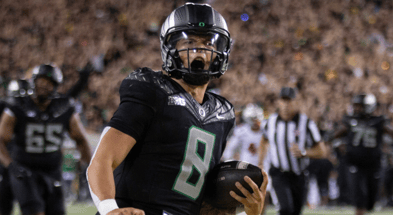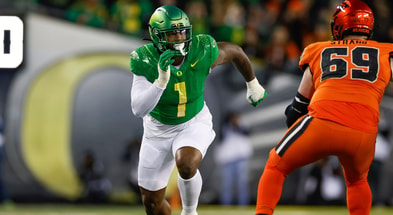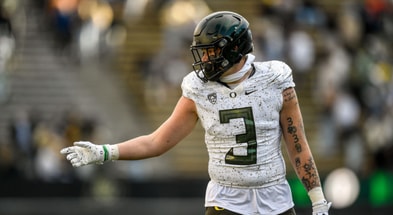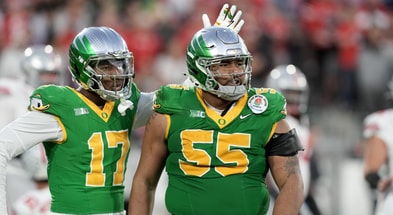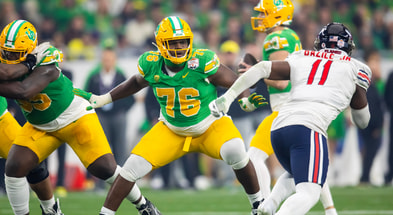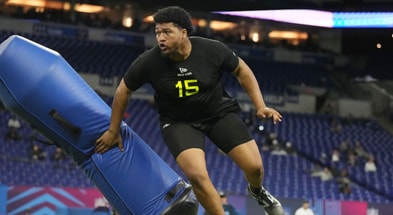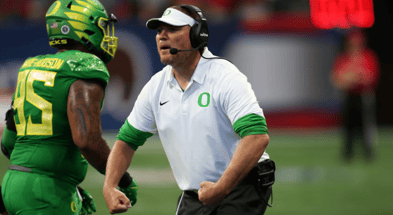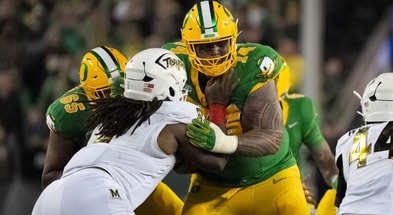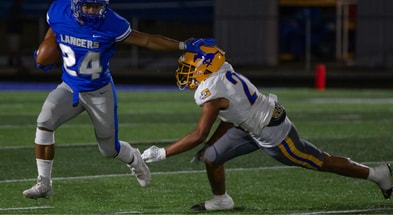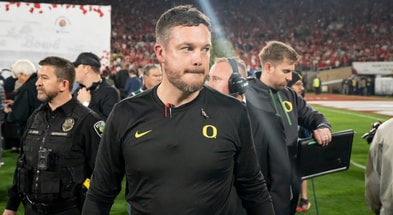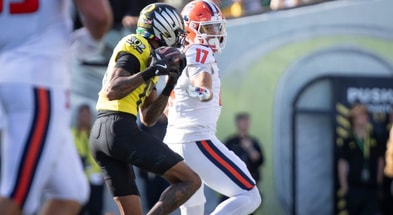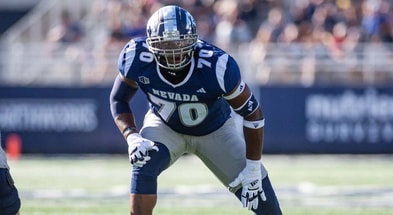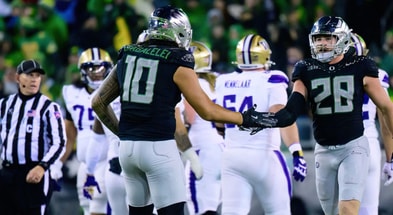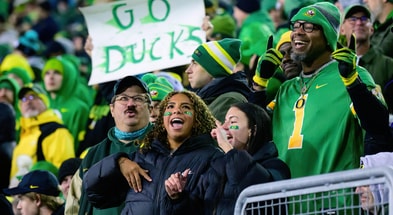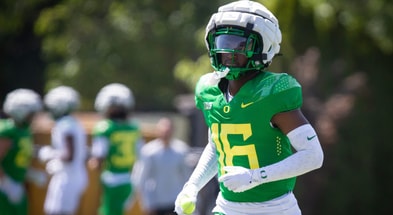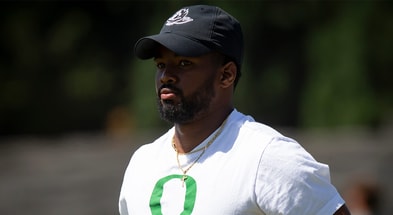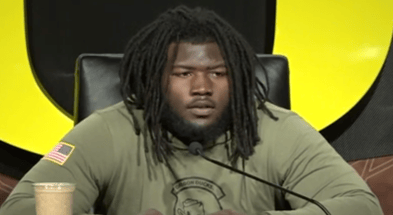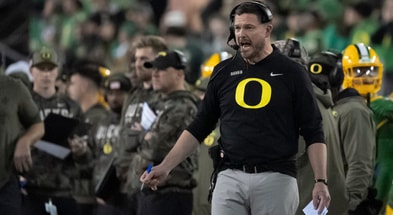Oregon defense keeping things simple in preparation for Utah rematch

It’s easy to look at Oregon’s blowout loss at Utah earlier this month and come to the conclusion that it was the Ducks’ worst defensive performance of the season.
It’s harder to identify why they were so bad.
The Ducks missed tackles. They were bullied at the line of scrimmage. They never found a way to deal with Utes’ tight end Brant Kuithe.
But for a defense that has been, for the most part, very good in 2021, the Nov. 20 loss in Salt Lake City is an outlier. So, what was it that went so wrong for Oregon?
“I look at what I did as far as a plan — we had our guys thinking too much,” Oregon defensive coordinator Tim DeRuyter said.
When the Ducks are at their best, they are flying to the ball and playing an ultra-physical brand of defense. But the Utes had them on their heels for four quarters and racked up 208 rushing yards — the most any team has accumulated against Oregon this season — while converting 11-of-14 third downs.
“(Utah) does a lot of shift-trade motion, and you want to be in the perfect defense,” DeRuyter said. “You have to communicate some, but if you’re thinking too much prior to the snap and your cleats aren’t in the grass getting ready to tee off on somebody, you’re doing something wrong as a coach.
“I told our defense that after the game: we’re going to give them a much simpler game plan where they can effectively do that so that we can do what we did (against Oregon State) on first down and be much better against the run.”
The Ducks will need to find a way to win the battle at the line of scrimmage against the Utah offense. They were consistently beaten there the first time they played the Utes, and defensive end Brandon Dorlus admitted afterward that it wasn’t a case of Oregon being unprepared.
He said the Ducks simply didn’t execute.
Against Oregon State a week later, Dorlus and nose tackle Popo Aumavae were both much better and played as well as they have all season against a very good Oregon State offensive line.
“(Utah) were more physical than us,” Aumavae said. “That’s something we hammer here every day — being physical. And they out-physicaled us. They ran the ball, we just couldn’t stop it.
“I’m excited for this week. A lot of adjustments and a lot of focusing on the little things.”
The Ducks gained back some confidence during their win over Oregon State last Saturday. The Beavers deploy a highly-effective, run-heavy scheme that is similar to Utah’s, and Oregon limited them to just 85 rushing yards.
“I think the biggest thing was our mindset,” Oregon safety Verone McKinley III said. “Especially, I can say personally, I missed two tackles against Utah. I didn’t have any last week — I sent a message.
“That’s what we wanted to do. We wanted to send a message. We knew what the stakes were… We wanted to send a message on tape so that when we see them again in Las Vegas, they know exactly what they’re gonna get.”
Top 10
- 1Breaking
Shedeur Sanders not drafted
Slide continues
- 2
10 Best Available Players
After Rounds 1-3 of NFL Draft
- 3
Picks by Conference
SEC, Big Ten continue to dominate Draft
- 4Hot
Jalen Milroe
Drafted before Shedeur Sanders
- 5Trending
Shedeur Sanders
Reportedly pranked by fake NFL team
Get the On3 Top 10 to your inbox every morning
By clicking "Subscribe to Newsletter", I agree to On3's Privacy Notice, Terms, and use of my personal information described therein.
Finding a better way to contain Kuithe, a two-time all-conference selection, will be at the top of Oregon’s priority list.
Kuithe exploded for 118 yards on five catches against the Ducks and frequently found himself wide-open over the middle. He is a difficult player to defend because of the way the Utes utilize him and the rest of their tight ends.
The Utes frequently roll out two — and sometimes three — tight end formations. Kuithe leads Utah in both receiving yards and receiving touchdowns, but the 539 snaps he has played this season are 14 fewer than fellow tight end Dalton Kincaid and just 63 more than Cole Fotheringham.
Oregon successfully limited the passing attack of Oregon State, which utilizes Teagan Quitoriano and Luke Musgrave in similar two-tight end sets.
“(Kuithe) is a guy that we have to know where he’s at,” DeRuyter said. “Because the times that he made plays on us, our eye discipline was not very good. We didn’t understand where number three was; we let him leverage us.
“We didn’t tackle him well. I’m not gonna go into the whole gameplan, but he’s gonna be a guy that our guys know about.”
DeRuyter and McKinley III both said doubling Kuithe will not be part of the game plan, though. That’s partially due to the fact there are so many other dangerous players in the Utah offense, but also because the Ducks are confident they will do a better job winning matchups this time around.
“No, because I feel like we’re good enough to cover anybody, we don’t need to double people,” McKinley III said when asked if he could envision the Ducks sending double-coverage Kuithe’s way. “They have a good tight end, but I feel like we have some good DBs, too.
“Of course myself — the tight end is gonna end up in the slot — I love that matchup. That matchup is going to happen; we will be manned up at some point in the game. It’s about winning your one-on-one.”

